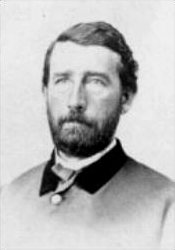Morton C. Hunter facts for kids
Quick facts for kids
Morton Craig Hunter
|
|
|---|---|
 |
|
| Member of the U.S. House of Representatives from Indiana's 3rd district |
|
| In office March 4, 1867 – March 3, 1869 |
|
| Preceded by | Ralph Hill |
| Succeeded by | William S. Holman |
| Member of the U.S. House of Representatives from Indiana's 6th district |
|
| In office March 4, 1873 – March 3, 1875 |
|
| Preceded by | Daniel W. Voorhees |
| Succeeded by | Milton S. Robinson |
| Member of the U.S. House of Representatives from Indiana's 8th district |
|
| In office March 4, 1875 – March 3, 1879 |
|
| Preceded by | James N. Tyner |
| Succeeded by | Abraham J. Hostetler |
| Personal details | |
| Born | February 5, 1825 Versailles, Indiana |
| Died | October 25, 1896 (aged 71) Bloomington, Indiana |
| Resting place | Rose Hill Cemetery, Bloomington, Indiana |
| Signature | |
| Military service | |
| Allegiance | United States of America Union |
| Branch/service | United States Army Union Army |
| Years of service | 1862–1865 |
| Rank | |
| Commands | 82nd Indiana Infantry 1st Brigade, 3rd Division, XIV Corps |
| Battles/wars | American Civil War |
Morton Craig Hunter (born February 5, 1825 – died October 25, 1896) was an important person in American history. He was a brave officer in the Union Army during the American Civil War. After the war, he became a U.S. Representative for Indiana, helping to make laws for the country.
Contents
Morton Hunter's Life Story
Morton Hunter was born in Versailles, Indiana. He grew up in a pioneer home, which meant life was often tough. His family had a history of serving their country. His father, John Hunter, fought in the War of 1812. His grandfather, who came from Scotland, fought in the American Revolutionary War.
Early Life and Education
Morton Hunter studied law at Indiana University in Bloomington. He finished his studies and graduated in 1849. Soon after graduating, he got married. He then started his own law practice in Bloomington. In 1858, he was chosen to represent Monroe County in the Indiana State House of Representatives. This was his first step into politics.
Serving in the Civil War
In the summer of 1862, President Lincoln asked for volunteers to join the army. Morton Hunter responded by forming a group of soldiers called the 82nd Indiana Infantry. On August 27, 1862, he was made a colonel by Governor Oliver Morton. He led his troops with great courage during the American Civil War.
Hero at Chickamauga
One of his most famous moments was at the Battle of Chickamauga. During this battle, a Confederate general named Longstreet attacked the Union army's right side. Morton Hunter quickly decided to form a new defense line on Horseshoe Ridge. This quick thinking helped save the Union army from a terrible defeat. His commanding officer, John Connell, praised Hunter's strong stand. He said it "truly and most fortunately changed the fortunes of that disastrous day."
Charging Missionary Ridge
Hunter's bravery was also clear at the Battle of Missionary Ridge. His 82nd Indiana regiment and the 99th Ohio were the first to attack the Confederate center. They were ordered to stop after taking the first line of defense. But Hunter's troops, facing heavy fire, decided to charge up the ridge. His 82nd regiment was the first of his division to reach the top. They took over the Confederate positions. This bold move helped break the Confederate lines and was a key moment in the battle. Hunter was highly praised for his courage that day.
He was later promoted to lead his regiment's brigade. This unit was part of the Fourteenth Army Corps under General George Thomas. Hunter led his unit during Sherman's March to the Sea. On January 13, 1866, President Andrew Johnson honored Hunter. He nominated him to be a brevet brigadier general of volunteers. This special rank recognized his excellent service. The United States Senate approved this honor on March 12, 1866. Hunter left the volunteer army on June 24, 1865.
A Career in Politics
After his military service, Morton Hunter continued his public service. He was elected as a Republican to the Fortieth Congress. He served as a U.S. Representative from March 4, 1867, to March 3, 1869.
He was later elected to Congress again. He served in the Forty-third, Forty-fourth, and Forty-fifth Congresses. His second period in Congress lasted from March 4, 1873, to March 3, 1879. During these years, he helped make laws for the entire country.
Later Years and Legacy
After leaving his political office, Morton Hunter worked in the stone industry. He operated a quarry in the Indiana limestone district. He died in Bloomington, Indiana, on October 25, 1896. He was buried in Rose Hill Cemetery. Morton Craig Hunter is remembered for his bravery as a soldier and his dedication as a politician.
See also
- List of American Civil War generals (Union)

